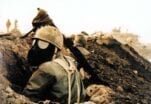
In 1979, after the fall of the Shah and the formation of the Islamic Republic in Iran, a chance appeared to present itself for strengthening the position of Iraq in the region. Until then Iran, also a large producer of oil and itself heavily armed, had been one of the leading powers in the Gulf region, holding two-thirds of the world’s oil reserves.
Taking advantage of the confusion and chaos surrounding the change of power there, Saddam Hussein’s regime hoped to fill the regional power vacuum that had been created. Baghdad also had set its sights on the conquest of Khuzestan – an ethnically Arab province of Iran, bordering on the Iraqi province of Basra and the Persian Gulf – and on regaining full control over the Shatt al-Arab (after the humiliation of the 1975 Algiers Treaty), which would eliminate Iraq’s landlocked situation.
Finally, Saddam Hussein hoped that, by involving Iran in a war, the new Islamic Republic would be weakened, and he could thus eliminate the encouragement the Islamic Revolution was undeniably giving to Iraq’s Shiites. Because of their shared fears about the export of this revolution, Iraq was assured of support, in any future conflict, from most Arab regimes and their Western allies, Tehran having further alienated itself from the West by taking hostage the staff of the US embassy.
Moreover, Khuzestan was the Achilles’ heel of the Iranian economy, because it contained most of the country’s oil reserves and oil-industry facilities. If Iraq could take possession of Khuzestan, it would control oil reserves even greater than those of Saudi Arabia.
On 17 September 1980, Saddam Hussein’s regime seized on verbal threats and a small border incident in order to revoke the treaty that had been wrested from it five years earlier, at Algiers, regarding the Shatt al-Arab, thus placing the border waterway again entirely in Iraqi hands. Five days later the Iraqi army invaded its neighbour along the coastal plain in Khuzestan; the Iraq-Iran War had broken out.
After this invasion, the United Nations Security Council did not condemn Iraq or call upon it to withdraw behind the internationally acknowledged boundary; it simply adopted a resolution calling on both parties to enter into an immediate cease-fire.
The surprise attack on Iran did not, however, have the results that Iraq and others expected. It did not lead to the collapse of the Islamic Republic but, in fact, helped consolidate its power. After Iran recovered from the initial shock, its troops were quickly able to halt the Iraqi advance. Nowhere did the Iraqi ground forces penetrate more than 75 to 100 kilometres into Iranian territory. Khuzestan’s Arab population did not flock to Saddam Hussein’s side.
By mid-1982 a series of offensives had driven the Iraqi forces back over their own border. The Iranian Air Force then took the war to Iraqi cities, causing great destruction, particularly in southern Iraq, and neighbouring Syria, with which relations had been difficult for many years, shut down the oil pipelines to the Mediterranean, cutting off Iraq’s most important source of revenue. Economic problems began to grow.






